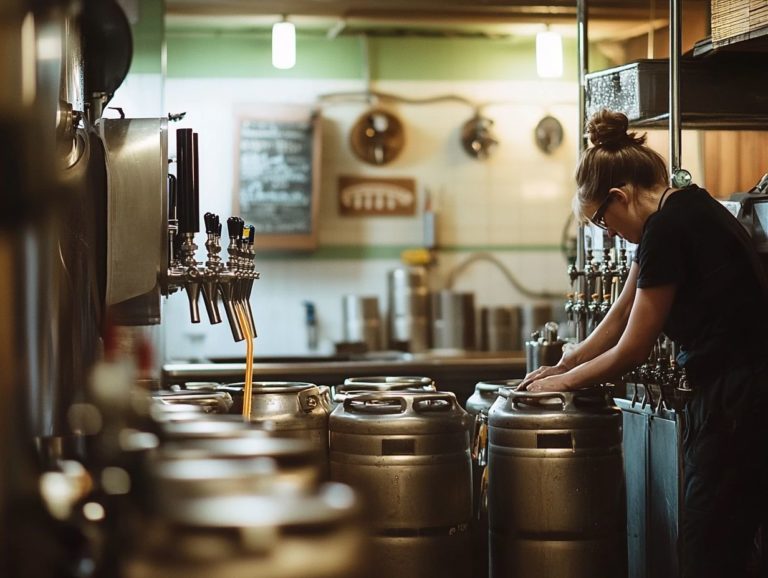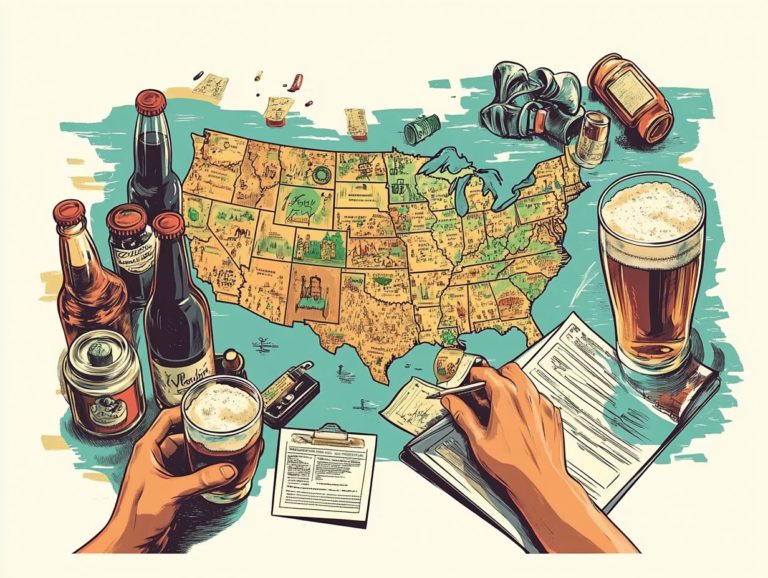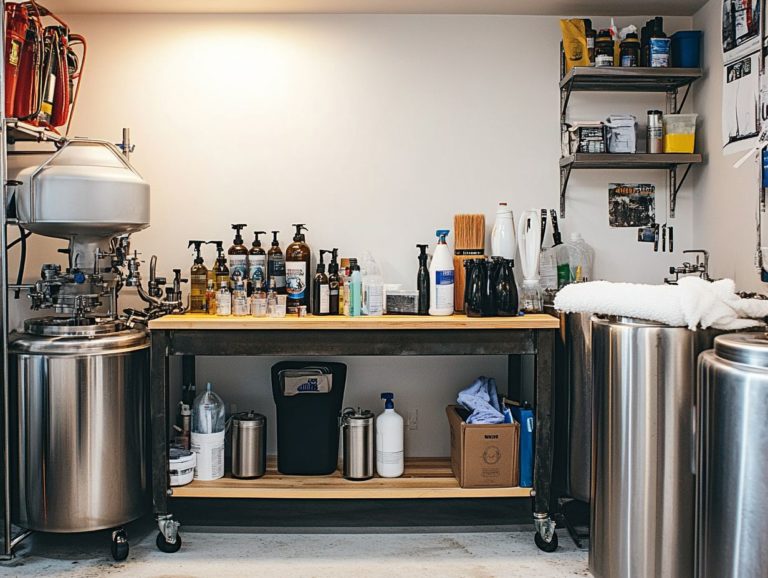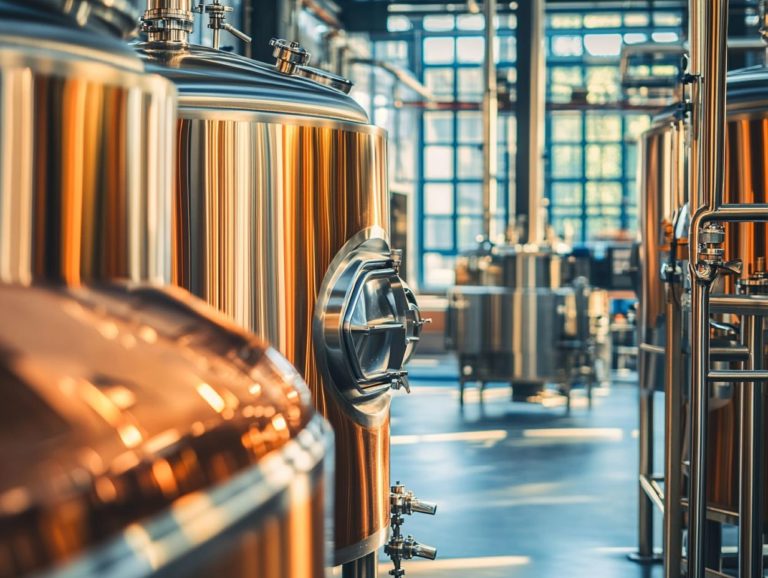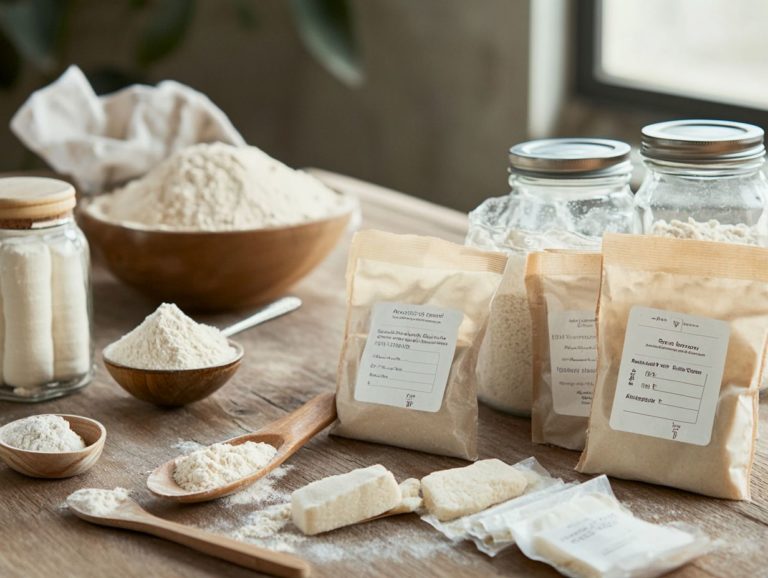What Is the Best Water for Brewing?
Contents
The Importance of Water in Brewing
Water is an essential element in brewing, influencing everything from flavor to aroma in ways you might not even realize.
With a variety of types available such as tap, filtered, spring, distilled, and reverse osmosis each option brings its own unique characteristics to your brewing process. Selecting the right water for homebrew is vital; factors like mineral content, pH levels, and chlorine presence can dramatically impact your brew’s quality.
This article dives into the different types of water, offers insights on how to treat it for optimal brewing, and guides you in finding the perfect water for your next batch. Additionally, it provides tips on water filtration and water purification methods to enhance your brewing experience.
Key Takeaways:
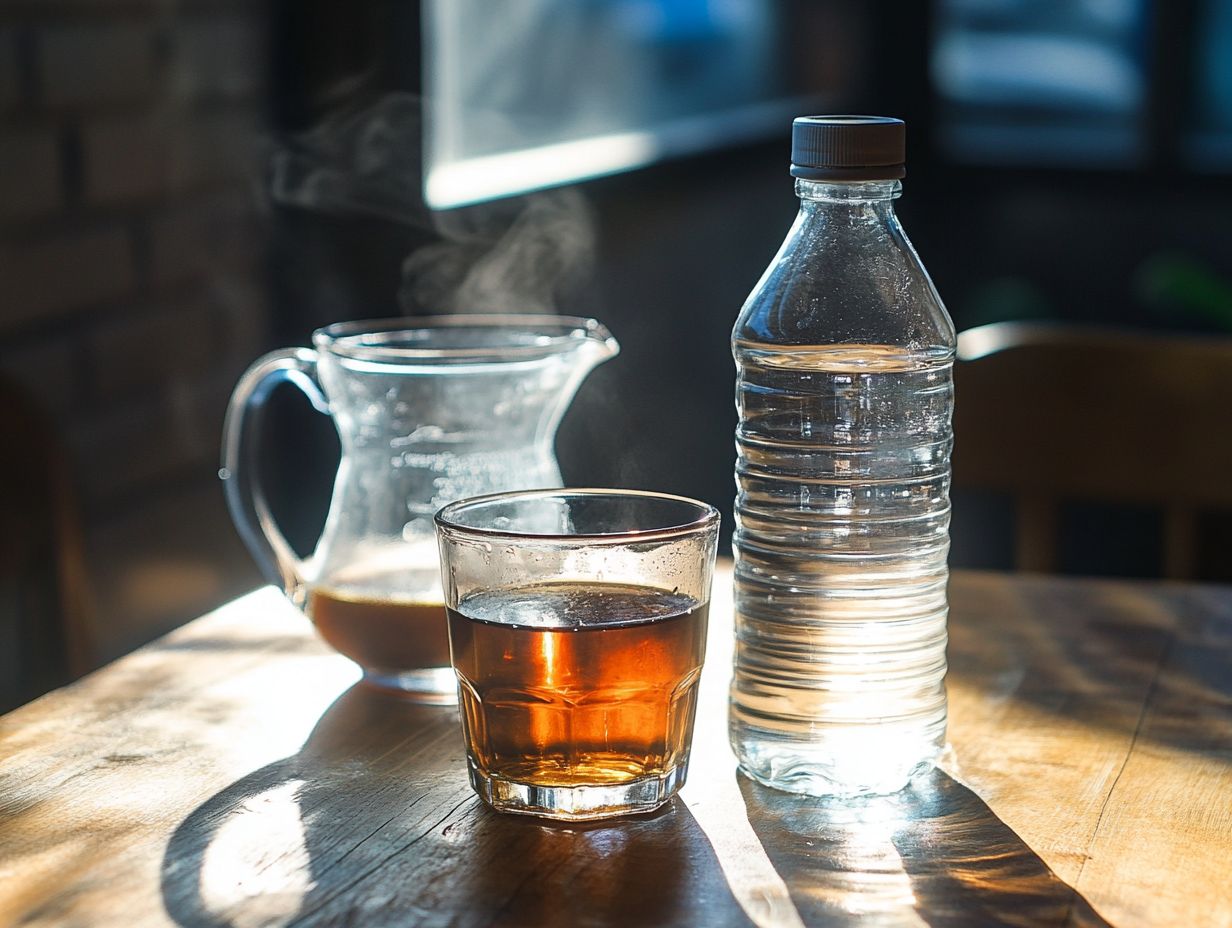
- Filtered water is the best option for brewing as it removes impurities and chlorine/chloramine that can affect taste. Understanding the chemical impacts of water types is crucial for optimal brewing outcomes.
- Consider the location and source of your water, as well as its mineral content and pH level, when choosing water for brewing. Options include tap water, bottled water, well water, and rainwater, each bringing unique qualities to your brewing process.
- Water can be treated for brewing through boiling, filtration, and adjusting mineral levels, depending on your specific needs and preferences. Employing Campden tablets for chloramine removal can also improve water quality.
Types of Water for Brewing
When you embark on the journey of brewing, the choice of water stands as a cornerstone to your success, shaping the flavors and quality of your final product. Each type of water be it tap, distilled, filtered, or spring brings its own set of characteristics that can profoundly influence the brewing process.
As a homebrewer, it s essential for you to understand these various water sources, including well water and rainwater, to achieve optimal yeast growth and a desirable mineral profile in your brews. Understanding brewing techniques and water treatment methods can help refine your brewing process.
The brewing community often finds itself engaged in spirited debates over the merits of reverse osmosis versus bottled water, making it crucial for you to consider the chemical implications of these water types on both flavor and brewing standards.
1. Tap Water
Tap water stands as one of the most accessible and widely utilized sources for homebrewing, but its quality can vary dramatically based on your location and the city water treatment processes in place. This variation introduces a range of compounds into your brewing mix, some of which may elevate specific flavors. However, others could lead to undesirable tastes and aromas.
This highlights the importance of testing your water quality; it is crucial for brewing success, ensuring your flavors shine through!
Take chlorine, for example. Commonly found in municipal supplies, high levels of chlorine can infuse your beer with a medicinal quality that masks its true flavor potential. Then there are chloramines these stable and less volatile disinfectants can be particularly troublesome. Since they re harder to eliminate, they may negatively impact yeast health and, ultimately, your brew.
Weighing the pros and cons of using tap water is essential for any brewer looking to make informed choices. While it s often the convenient route, you cannot underestimate the importance of testing and treating this water source. Understanding tap water safety and employing appropriate water treatment methods ensures better brewing outcomes.
To combat the effects of chloramines, employing Campden tablets is a smart move. This simple step ensures a smoother brewing process, leading to a superior final product that truly reflects your craft.
Conclusion
Choosing the right water for brewing is a crucial step in the process that can significantly impact the flavor and quality of your beer. Experiment with different water types in your next brewing session to discover unique flavors!
Types of Water for Brewing
2. Filtered Water
Filtered water stands as an exceptional choice for brewers seeking to elevate the quality of their brewing water by eliminating impurities and chemicals that could compromise yeast performance and flavor profiles.
By employing various filtration techniques, such as carbon filters and reverse osmosis systems, you can significantly transform the properties of your water. This creates an ideal environment for fermentation and aligns with eco-friendly brewing practices, reducing the need for bottled water.
Carbon filters effectively diminish chlorine and sediment, ensuring a cleaner, more refined taste. On the other hand, reverse osmosis provides a thorough elimination of impurities, delivering pure water that facilitates intricate brewing methods.
Pure water enhances the flavors extracted from your malt and hops, resulting in a more balanced and aromatic final product. Incorporating these water choices into your brewing methods can refine your brewing techniques and overall brewing standards.
It s essential for you to understand how your chosen filtration system aligns with specific brewing styles, as different methods may necessitate unique adjustments to achieve the best possible outcomes.
3. Spring Water
Spring water is often revered by brewers for its exceptional natural mineral profile, which can significantly enhance the flavor and quality of the beer.
This precious resource, drawn directly from underground springs, offers a unique blend of minerals such as calcium, magnesium, and bicarbonates. This makes spring water an excellent choice for achieving optimal brewing flavors and water recommendations for various brewing styles.
Each of these elements contributes to the brewing process in its own distinctive way. Different springs produce varying mineral compositions, which can impact everything from the mouthfeel to the aroma of the final product.
Embracing spring water aligns with eco-friendly practices, reducing the carbon footprint typically associated with heavily processed water sources. Explore different types of spring water and discover how these variations can refine your brewing techniques, ultimately leading to a richer, more diverse, and flavorful beer experience.
4. Distilled Water
Distilled water, having undergone a meticulous purification process, is stripped of minerals and impurities, making it an exceptional choice for brewers who desire complete control over their brewing journey. Distilled water allows for precise water extraction and adjustments, resulting in better brewing flavors and consistency.
While this pristine quality can elevate certain flavors by offering a clean canvas for brewing, it may present challenges in flavor development. Minerals are essential in extracting the desired compounds from your ingredients. Without crucial elements like calcium and magnesium, your brews might lack depth, resulting in flat or muted tastes that compromise the overall quality.
To achieve optimal brewing results, it s essential for you to understand how to adjust mineral levels effectively when using distilled water. This could involve incorporating specific salts, such as gypsum or calcium chloride, to restore balance and complexity. By doing so, you can enhance mouthfeel and craft flavor profiles tailored to the diverse styles of beer you wish to create.
Unlock the full potential of your brews by choosing the right water for your brewing process!
5. Reverse Osmosis Water
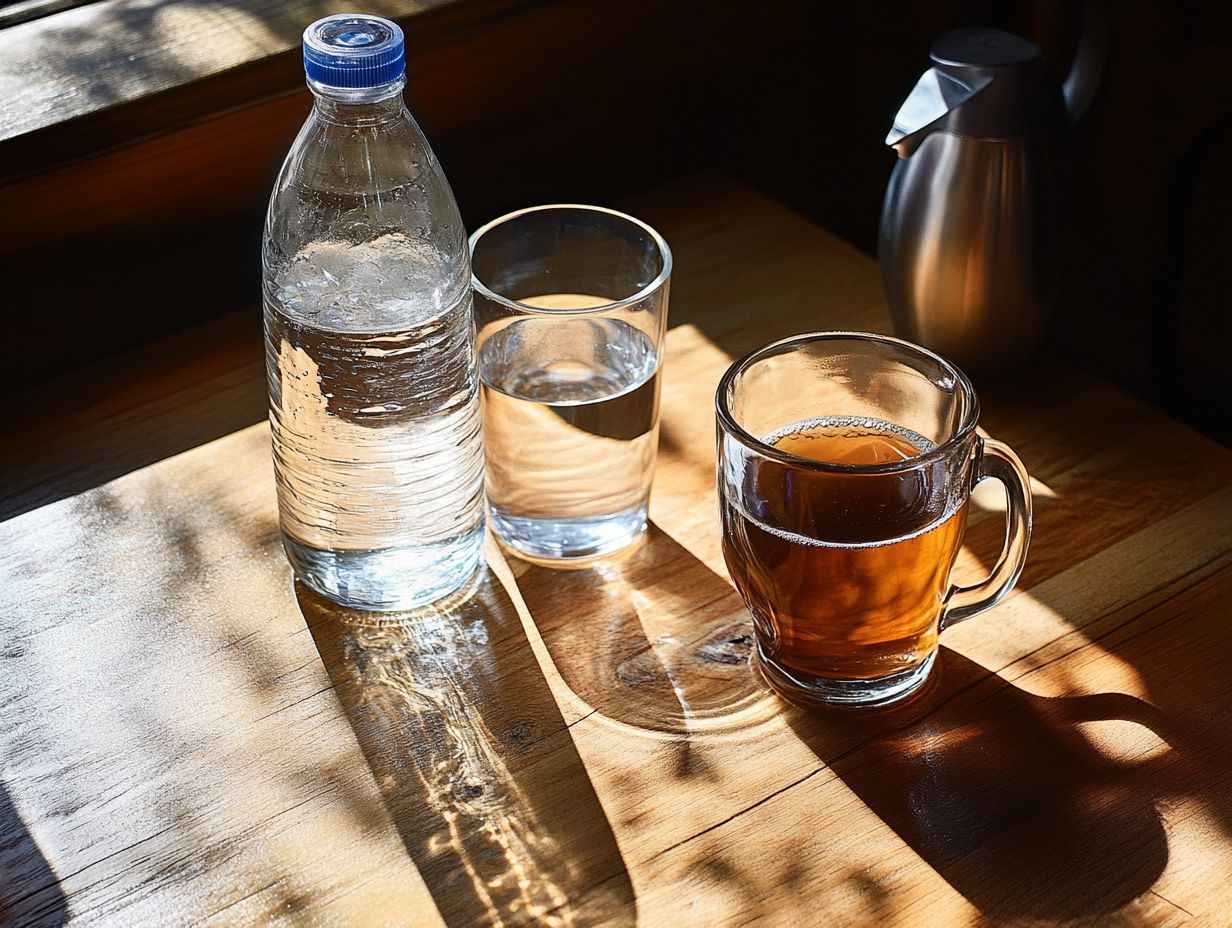
Reverse osmosis (RO) water is very clean, stripping away most contaminants. This makes it a favored choice among brewers who seek careful control over their water quality.
This remarkable process utilizes a special filter that lets clean water through while blocking contaminants. It effectively eliminates impurities think minerals, chlorine, and bacteria ensuring that the water is pristinely clean for brewing.
By using RO water, you essentially start with a blank canvas, which can profoundly influence the flavor profiles of your final product.
However, it s crucial to recognize that this demineralized water lacks the essential minerals that enhance the overall taste and mouthfeel of beer. Thus, re-mineralizing RO water becomes essential to achieving the brewing characteristics you desire. The right balance of minerals can significantly improve extraction during mashing and fermentation.
Not only does this technique shape the brewing process, but it also guarantees consistency and quality in your finished beer. This enables you to tailor each batch to meet specific style requirements.
Which Water is Best for Brewing?
Determining the ideal water for brewing requires your thoughtful attention to several critical factors, such as water quality, mineral content, and pH levels. Each of these elements plays a vital role in the brewing process, influencing not only the extraction of flavors but also the overall character of the final product.
Taking the time to assess these aspects will allow you to elevate your brewing experience and achieve the perfect cup.
Factors to Consider when Choosing Water for Brewing
When selecting water for brewing, several key factors come into play, including water analysis, practical brewing tips, and a solid understanding of water characteristics that can influence your brewing outcomes.
The mineral content, pH level, and even the temperature of your water can dramatically affect the flavors in your final product. For instance, a higher concentration of calcium can enhance the mouthfeel of your brew, while magnesium adds depth to the overall flavor complexity.
On the flip side, the presence of chlorine or other impurities can introduce off-flavors. This makes it essential for you to prioritize a thorough water analysis before diving into the brewing process.
By customizing your water selection to match the specific style of beer or coffee you re brewing, you can elevate your brewing techniques and achieve the taste profiles you desire. This process involves detailed water analysis and understanding the water characteristics that best suit your brewing methods.
1. Location and Source of Water
The location and source of water are pivotal in determining its suitability for brewing. Different regions boast vastly different water profiles that can profoundly influence the final product.
Take, for instance, areas rich in limestone deposits. They typically yield hard water brimming with essential minerals like calcium and magnesium, which are ideal for robust beer styles such as IPAs and stouts.
On the other hand, if you find yourself in a region with softer water, often characterized by granite or sandstone, you’re looking at a perfect match for lighter beers like lagers and pilsners. Proper water treatment and the use of testing are essential to determine the best water profile for your brewing styles and techniques.
The quality of tap water, well water, and rainwater can vary dramatically based on local geography and environmental factors. In urban settings, for example, tap water might suffer from contamination due to industrial pollutants, while rural areas often draw from pristine underground aquifers.
Homebrew enthusiasts often compare different water sources like spring water and bottled water to achieve the desired water quality. This fascinating variety in water sources shapes how brewers create unique flavors!
This geographical diversity continues to shape brewing practices. Brewers frequently tailor their techniques and recipes to align with the unique water profiles inherently tied to their locales. With a focus on eco-friendly brewing, many utilize soft water or hard water, adjusting their brewing techniques as necessary.
Start experimenting with different water types today and unlock the full potential of your brewing skills!
2. Mineral Content
The mineral content of your water plays a pivotal role in elevating brewing flavors and enhancing the overall quality of the beer you produce. It’s crucial to analyze your water using water testing kits to ensure it meets brewing standards.
Understanding how key minerals like calcium, magnesium, sulfate, and chloride influence your final product can lead to remarkable outcomes. For example, calcium is essential for enzyme activity during mashing, while magnesium can impart a subtle bitterness that some beer styles embrace. The interplay between sulfate and chloride deserves special attention; sulfate sharpens hop bitterness, making it a go-to for pale ales, whereas chloride enhances the perception of malt sweetness, perfect for richer styles like stouts. This mineral profile is essential in crafting distinct brewing flavors.
As a brewer, you may find it beneficial to analyze your water and adjust mineral levels using salts such as gypsum or calcium chloride. This allows you to customize your brews according to specific techniques and styles, transforming your creations into something truly exceptional. Consider consulting brewing forums and the brewing community for additional brewing tips and water recommendations.
3. pH Level
The pH level of your brewing water can significantly influence both the brewing process and yeast growth, making it an essential factor for you to monitor and adjust. Achieving the ideal pH level is crucial, as various brewing styles like lagers, ales, and stouts thrive within specific pH ranges. For example, lagers typically prefer a slightly more acidic environment, hovering around 5.2 to 5.4, while ales tend to perform best between 5.4 and 5.6. Using a pH meter can help ensure your brewing water meets the necessary water characteristics for these styles.
Even slight variations in pH can impact yeast activity by altering their metabolic functions, which in turn affects fermentation efficiency. This can also influence how well flavors are extracted from the grains, ultimately shaping the beer’s taste profile. Monitoring these factors with water analysis tools can provide deeper insights into your brewing process.
By regularly testing the pH, you can ensure optimal conditions for your brew, adjusting with food-grade acids or alkalizing agents as necessary to maintain those desired levels.
4. Chlorine and Chloramine Levels
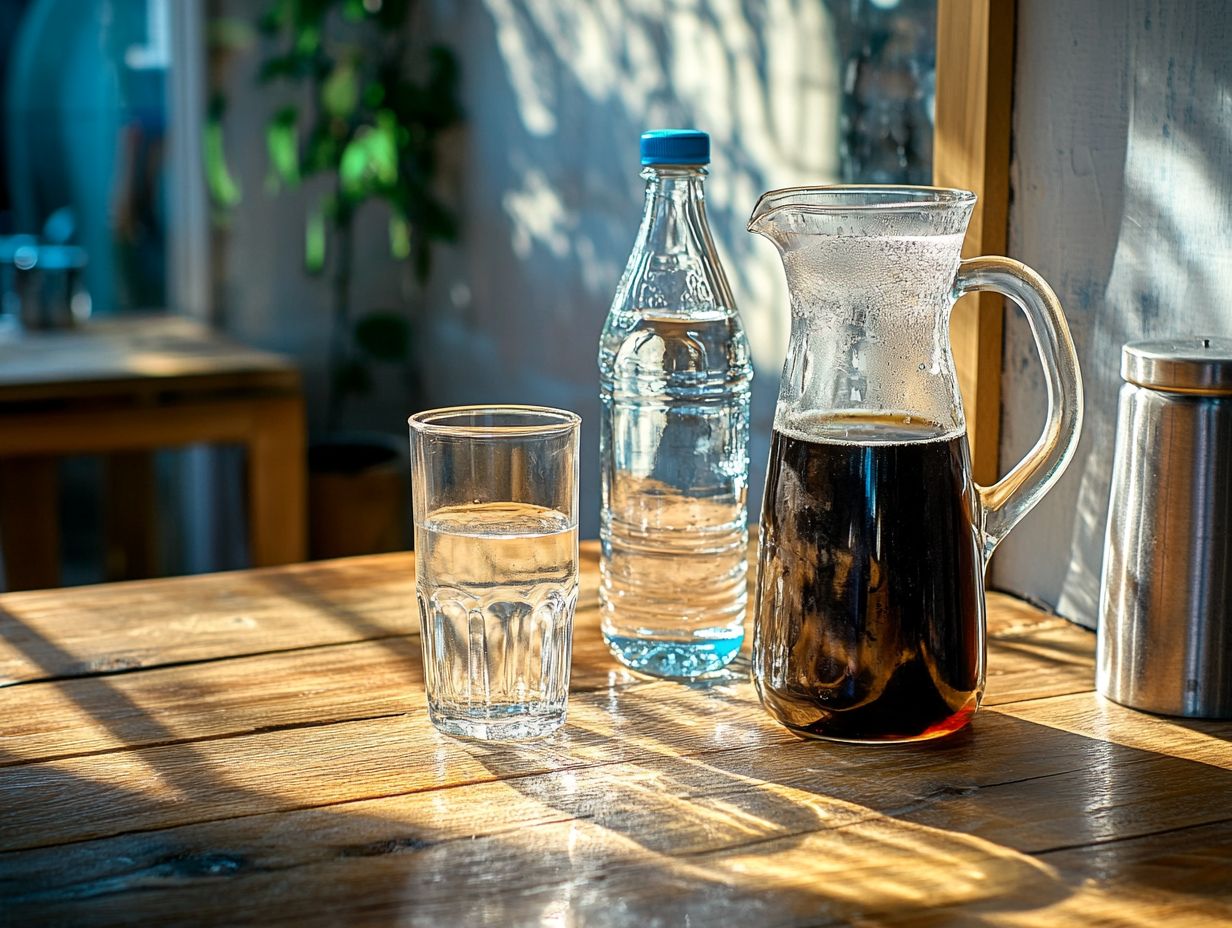
Chlorine and chloramine levels in your water can present considerable challenges for brewing, as these chemicals can negatively impact yeast health and the overall flavor profile of your creations. Using water filtration systems like activated carbon filters or reverse osmosis can be effective in chloramine removal.
When these substances are present, they can introduce off-flavors and stall fermentation, ultimately jeopardizing the quality of your final product. To address these concerns, many brewers like you often turn to solutions such as Campden tablets, which effectively neutralize chlorine and chloramine, providing you with a clean slate for fermentation. Proper water treatment is essential for maintaining high water quality in your brewing water.
By implementing proper water treatment techniques, you not only eliminate these unwanted compounds but also tailor your water profile to enhance specific beer styles. This meticulous attention to water quality is essential in achieving the desired taste and consistency in your brewing outcomes. Additionally, understanding the chemical impact of different treatments ensures your brewing process is optimized.
How to Treat Water for Brewing
Treating water for brewing is an essential step that can significantly elevate the quality and flavors of your final product. Different water choices, such as using RO water or distilled water, can provide various benefits depending on your brewing needs.
Treating water for brewing is an essential step that can significantly elevate the quality and flavors of your final product. With a variety of water sources available, including tap water, distilled water, and spring water, selecting the right water for your brewing needs is crucial.
By employing techniques such as boiling, filtration, and chemical treatments, you can ensure that the water you use enhances rather than hinders your brewing experience. Effective water purification methods are key to maintaining high water quality for brewing.
1. Boiling
Boiling stands out as one of the simplest yet most effective methods for treating water in the brewing process. It ensures that your water is purified and free from undesirable microorganisms. This method is often recommended in brewing forums for its simplicity and effectiveness.
This essential step does more than just eliminate bacteria, viruses, and other pathogens. It also enhances the overall flavor and quality of your final brew. By reaching a rolling boil, you allow any dissolved gases to escape from the water. This significantly improves flavor extraction during brewing, especially when using malt extract in your recipes.
Remember, the duration of boiling profoundly impacts water quality. A minimum of 15 minutes is typically recommended to achieve optimal sterilization. If you’re aiming to refine your brewing process, consider the size of your kettle and the intensity of the heat. Both can enhance the efficiency of your boiling.
Don t forget to use a thermometer! It s key to achieving the perfect boil and brewing a cleaner, more enjoyable beer.
2. Filtration
Filtration is a crucial technique for elevating the quality of your brewing water. It effectively removes impurities and enhances your overall brewing experience. Utilizing water filtration systems can address common brewing issues related to water quality.
By employing various filtration methods, you ensure optimal water conditions that significantly impact the taste and character of your final product. For example, activated carbon filters are popular because they absorb chlorine and other harmful substances that can interfere with your beer’s flavor. If you’re looking for a more comprehensive solution, consider reverse osmosis systems. These systems strip water of nearly all dissolved solids, allowing you to craft water profiles tailored to specific beer styles. Filtered water can be a key element in achieving the desired brewing quality.
Proper filtration is crucial. It enhances the sensory qualities of your brew and contributes to a consistent, high-quality final product.
3. Chemical Treatments
Chemical treatments are essential for preparing water for brewing. They allow you to tackle specific challenges related to water quality and chemical composition. This step is vital for homebrewers aiming for consistent and high-quality results.
By utilizing various chemical solutions, you can fine-tune your water’s characteristics to perfectly match the style of beer you aspire to create. A popular choice is Campden tablets, which effectively eliminate chlorine and chloramine from tap water. This prevents unwanted off-flavors that could spoil your brewing process. These tablets release sulfur dioxide, which neutralizes harsh chemicals and enhances the water’s suitability for fermentation. This is an important aspect of water treatment that every brewer should consider.
Beyond Campden tablets, there are other treatments available. For instance, phosphoric acid helps lower pH, while calcium salts boost mineral content. Each of these plays a crucial role in achieving your desired brewing standards and ensuring a high-quality final product. These adjustments are often discussed in brewing forums where the community shares their experiences and recommendations.
4. Adjusting Mineral Levels
Adjusting mineral levels in your brewing water is vital for achieving the flavor profiles you desire. It ensures your brewing recipes shine.
Understanding the right balance of key minerals like calcium, magnesium, sulfate, and chloride will transform your brewing experience! Each mineral plays a pivotal role in the final taste of your beer. These adjustments create optimal water characteristics for various brewing styles.
For example, calcium helps with clarity and stability, while sulfate enhances hop bitterness. By utilizing brewing salts such as gypsum or calcium chloride, you can make precise adjustments to the mineral content, tailoring the water chemistry to your chosen beer styles. Proper water extraction techniques are crucial for achieving desired brewing outcomes.
To effectively analyze and modify mineral content, consider using water testing kits or lab services. These tools provide detailed insights into your current mineral levels, empowering you to make informed changes that elevate your brewing results to new heights. Regular water analysis and monitoring are essential for maintaining optimal water quality in your brewing system.
Frequently Asked Questions
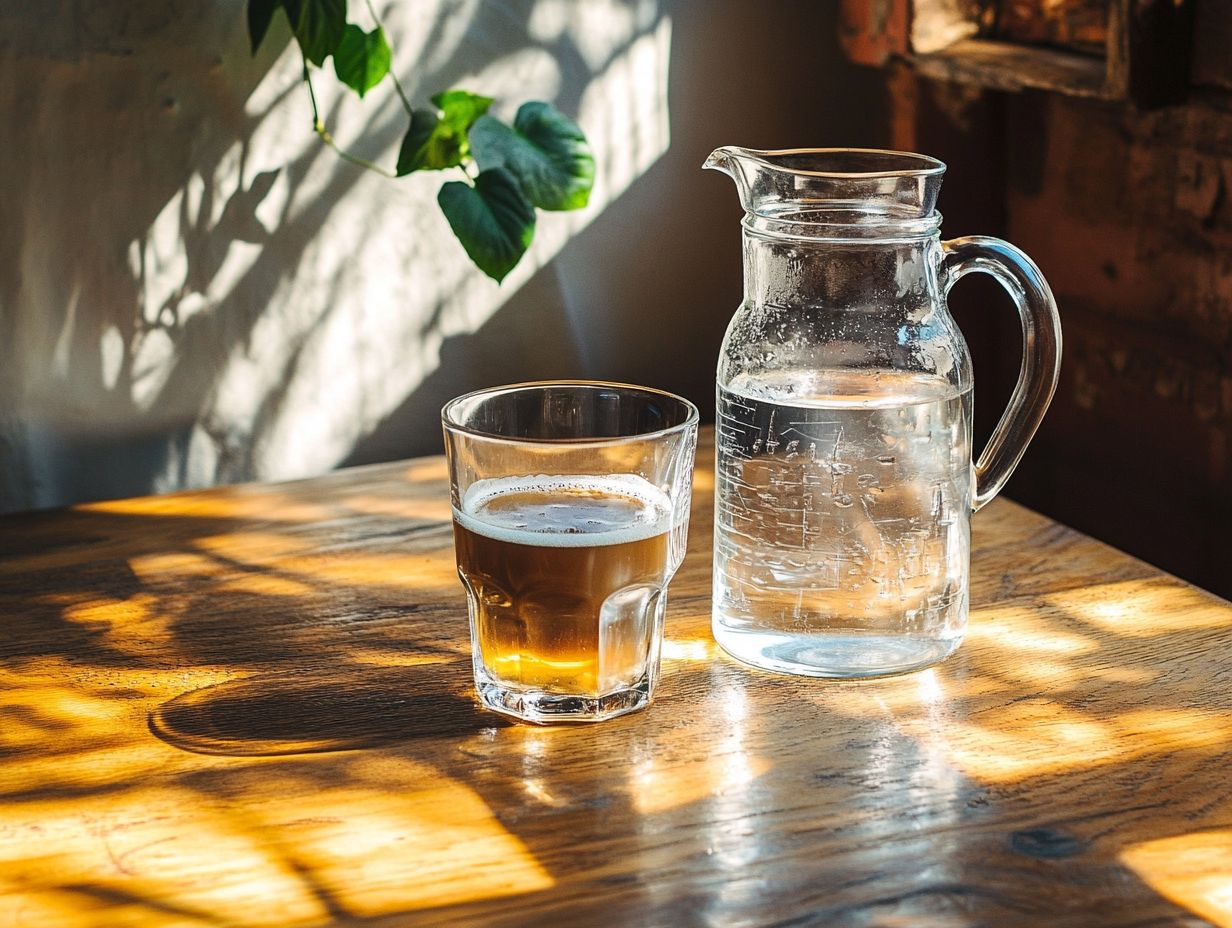
What Is the Best Water for Brewing?
The best water for brewing is free from impurities or contaminants, has the right mineral content, and a balanced pH level.
Why Is the Quality of Water Important for Brewing?
The quality of water used in brewing greatly affects the taste, aroma, and overall quality of the beer. Water can make up to 95% of the final product. Therefore, it is essential to use the right water for brewing. Ensuring tap water safety and implementing proper water treatment techniques can significantly impact your brewing outcomes.
What Are the Ideal Mineral Levels in Brewing Water?
The ideal mineral levels in brewing water vary depending on the style of beer being brewed. Generally, calcium, magnesium, and sulfate are important, but their levels should be balanced and not too high. Understanding the mineral profile of your water can significantly improve your brewing results.
What Types of Water Should Be Avoided for Brewing?
Tap water, distilled water, and highly chlorinated water should be avoided for brewing. Tap water may contain chlorine, which can affect the taste of the beer. Distilled water lacks minerals necessary for brewing, and highly chlorinated water can also affect the flavor of your beer. Bottled water is sometimes used, but it s important to verify its mineral content.
Can I Use Filtered Water for Brewing?
Yes, filtered water can be a good option for brewing as long as it does not remove essential minerals. It is recommended to use a filter specifically designed for brewing to ensure the best quality water for your beer. Many brewers also consider reverse osmosis or water filtration systems for more precise control over their brewing water.
What is the best way to test the quality of water for brewing?
Understanding Water Quality for Brewing
If you’re serious about brewing, testing your water quality is essential! Getting a water analysis from a certified laboratory provides a detailed breakdown of minerals and pH levels.
This analysis allows you to make the necessary adjustments for the perfect brewing water. Don’t leave your brewing success to chance test your water quality today!

